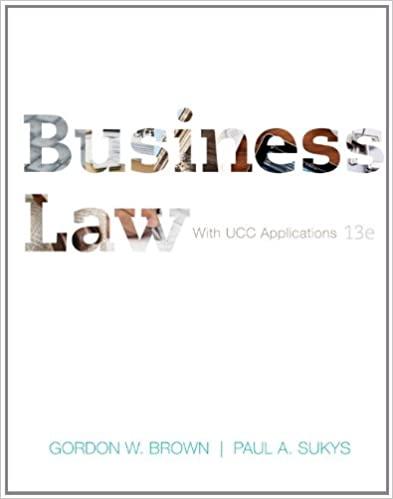New England Surrogate Parenting Advisors (NESPA) is a nonprofit organization the purpose of which is to match
Question:
New England Surrogate Parenting Advisors (NESPA) is a nonprofit organization the purpose of which is to match potential surrogate mothers with couples who are unable to have children of their own. In this case, a surrogate mother candidate was matched up with a couple who wanted to have a baby but could not do so on their own. The couple and the surrogate mother entered an agreement that stipulated that the father would pay for all pregnancy expenses plus a $10,000 fee to the mother for “conceiving, carrying and giving birth to the child.” The fee was to be transferred to the surrogate mother in installments based on a structured payment plan. The final $3,500 was to be paid to the surrogate mother when the child was born. All three parties to the agreement—the surrogate mother, the father, and the father’s wife—underwent psychological screening by a psychologist. The psychologist reported that the surrogate mother was a stable, considerate, and knowledgeable woman who was aware of what she was doing and would be emotionally and psychologically capable of transferring custody to the child’s biological father. For a while everything went according to the contract. The surrogate mother conceived a child by the father. The first two payments were sent and accepted by the mother. However, at the end of the sixth month, after receiving the third payment, the mother changed her mind, returned that third payment, and told the father’s attorney that the contract was ended. That was the only money returned. She kept the first two payments and the expense money she had received under the agreement. The father sued for custody, arguing that the surrogate mother had breached the contract. The judge agreed and transferred custody to the father based on the contract and because she believed such a move would ultimately be in the child’s best interests. The surrogate mother appealed. The state supreme judicial court noted that, since the state had no statute covering this type of agreement, it would apply an adoption statute that was roughly analogous to the situation. Under that statute, a mother could not give up her child for adoption until four days after the child’s birth. The statute also outlawed the payment of money to the mother for an adoption, although she could be paid pregnancy expenses. If the court applies this statute to this case, the contract is illegal and, therefore, void. Can the court apply an adoption statute to a contract claim? If so, should the court apply that statute in this case?
Moreover, if it does apply the statute, what is the net effect of that application in this case? In other words, who wins? (See R.R. v. M.H. and Another, 426 N.E.2d 790 (Supreme Court of Massachusetts).)
Questions
1. Can the judge apply adoption law to a contract case, or should she confine her ruling to contract law? Explain
2. Sometimes a judge will apply the public policy doctrine in this type of a case. What is public policy? Explain.
3. Does public policy apply here? Explain. If public policy applies, what would the result be? Explain.
4. Could the surrogate mother argue that the contract is void because she was suffering from a mental impairment when she entered the agreement? If so, would she win? Why or why not?
5. Should the court consider the best interests of the child in a contract case like this? Explain.
Step by Step Answer:

Business Law With UCC Applications
ISBN: 9780073524955
13th Edition
Authors: Gordon Brown, Paul Sukys





